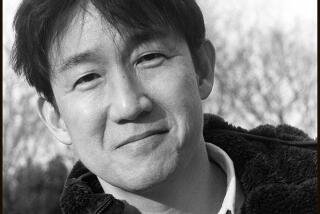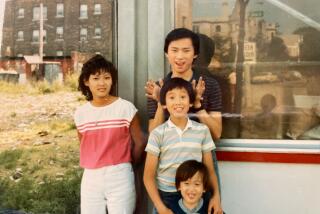FIRST FICTION
THE BRUTAL LANGUAGE OF LOVE; By Alicia Erian; Villard: 210 pp., $21.95
Love is indeed a brutal language in this collection of nine stories, even if Alicia Erian’s young protagonists-typically women at the mercy of their loved ones or their own emerging selves-still appear to be working out the grammar.
Taken from a distance, these people are familiar creatures of modern American fiction, the kind who live just over there-who dump Ragu on spaghetti, take notice of the waft from the septic tank and occasionally find themselves in compromising emotional situations. Yet, up close, they don’t seem like cut-outs at all; they’re strange and weirdly sturdy, too, even when they’re at their most precarious: In “Standing Up to the Superpowers,” an underachieving undergraduate and her date rapist establish an unlikely rapport, uniting themselves against a predatory Russia. In “Alcatraz,” an overweight 13-year-old gets herself mixed up in some seriously adult sex play, which barely registers a blip on her adolescent radar. “Bikini” tells of a young woman forced to swim for her survival by a chauvinistic insecure boyfriend, a man she’ll eventually accept as her husband. And “Lass” tracks a nice American girl to Dublin, where she gamely puts up with daily harassment from a charming Irish novelist who happens to be her new father-in-law.
Somehow, you never get the feeling that these characters are merely making laps around the sexual dysfunction mall. Maybe it’s because Erian manages to be smart without being smart-alecky, transforming these messy scenarios into instructive little dramas.
*
MOUTHING THE WORDS; Camilla Gibb; Carroll & Graf: 192 pp., $25
Camilla Gibb’s first novel-about a majorly out-of-it heroine whose travails make “Jerry Springer” seem tame-was apparently a big deal when it was published in Canada. It’s the kind of book in which you don’t know the name of the person you’re reading about until halfway through. Perhaps this drab, mercilessly mistreated woman is meant to be an anonymous stand-in for us all, or is the author up to something else? It’s hard to tell; sometimes you wonder whether Gibb is up to anything other than drawing up a laundry list of victimhood: incest, abuse, anorexia, depression, schizophrenia. We even get a dorm-room gang rape when Thelma Ann Barley-that’s her name-returns from Canada to her native England to read law at Oxford. But is it real, or a paranoid delusion? Who knows? “I am perplexed. I run my fingertip over my name, mesmerized. Thelma Ann Barley. That’s me, I think. I am Thelma.”
Ever hazy, drifting passively from one mistreatment to another, suddenly in law school after last being seen at 13, is it an accident that Thelma is finally given a surname that so closely echoes the word “barely’? Like a classic lip-sync performance, “Mouthing the Words” manages to be in your face and hardly there at the same time.
*
GABRIEL’S STORY; By David Anthony Durham; Doubleday: 296 pp., $23.95
David Anthony Durham is a writer of Caribbean ancestry who lives in both the United States and Scotland. His first novel-a western that’s as lyrical as it is thrilling-gathers up these various outposts of personal geography and unites them amid the large-scale diorama of the American West. It’s about a surly kid named Gabriel who is brought from Baltimore to a Kansas homestead by his ex-slave mother. The Civil War is a not-so-distant memory, and so we’re immediately set down in a cultural and topographical tabula rasa: the earliest days of free blacks and their westerly progress into a barren landscape.
Gabriel, however, can’t see the charm of sod-busting; he seethes with that bottomless anger we recognize from hundreds of westerns. So when a troop of white cowboy outlaws passes through town-accompanied by a kindly Scot-Gabriel and his pal James jump at the chance to ride the range, leaving the hardscrabble, sedentary life behind.
If Durham were a songwriter, you might think of him as reworking a beloved standard; it’s a tricky task, but Durham pulls it off. As Gabriel and James move “ever deeper into the West, into a land that swallowed them without end,’their surroundings become as unfriendly as their companions, an angry bunch of no-goods who make the boys-although Durham doesn’t quite put it this way-their slaves.
“Gabriel’s Story” is the kind of book you wolf down like stew dished up at a campfire. But it’s also a carefully wrought meditation on the big stuff: race, family, crime and the cruelties reaped from living on the outskirts of society.
More to Read
Sign up for our Book Club newsletter
Get the latest news, events and more from the Los Angeles Times Book Club, and help us get L.A. reading and talking.
You may occasionally receive promotional content from the Los Angeles Times.






